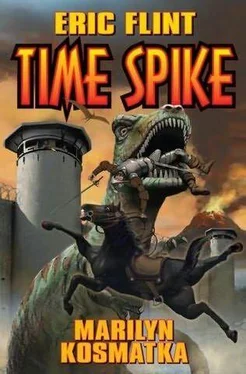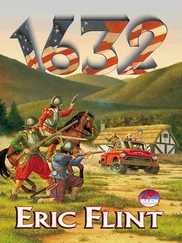Eric Flint - Time spike
Здесь есть возможность читать онлайн «Eric Flint - Time spike» весь текст электронной книги совершенно бесплатно (целиком полную версию без сокращений). В некоторых случаях можно слушать аудио, скачать через торрент в формате fb2 и присутствует краткое содержание. Жанр: Фэнтези, на английском языке. Описание произведения, (предисловие) а так же отзывы посетителей доступны на портале библиотеки ЛибКат.
- Название:Time spike
- Автор:
- Жанр:
- Год:неизвестен
- ISBN:нет данных
- Рейтинг книги:5 / 5. Голосов: 1
-
Избранное:Добавить в избранное
- Отзывы:
-
Ваша оценка:
- 100
- 1
- 2
- 3
- 4
- 5
Time spike: краткое содержание, описание и аннотация
Предлагаем к чтению аннотацию, описание, краткое содержание или предисловие (зависит от того, что написал сам автор книги «Time spike»). Если вы не нашли необходимую информацию о книге — напишите в комментариях, мы постараемся отыскать её.
Time spike — читать онлайн бесплатно полную книгу (весь текст) целиком
Ниже представлен текст книги, разбитый по страницам. Система сохранения места последней прочитанной страницы, позволяет с удобством читать онлайн бесплатно книгу «Time spike», без необходимости каждый раз заново искать на чём Вы остановились. Поставьте закладку, и сможете в любой момент перейти на страницу, на которой закончили чтение.
Интервал:
Закладка:
Chapter 36 Lieutenant Rod Hulbert, using a pair of field glasses taken from the storeroom the day of the Quiver, watched the people inside the small circle of huts sitting two dozen yards from the edge of a small creek. He had counted thirty-three adults and twelve children. During his briefing prior to leaving the prison, he had been told there was a possibility of running across any group of people who had ever lived in southern Illinois. The most famous and the most plentiful of these ancient groups were the Mound Builders. But Rod was certain these men, women and children were not members of that ancient tribe. They might be their predecessors, or maybe a nomadic people who happened to be in the wrong place and wrong time when the Quiver hit.
But their technology was wrong for that group, judging from everything the prison guards had been able to put together about the Mounds people. Which was quite a lot, actually. Living in the area, several of the guards had wound up, one way or another, knowing a fair amount about the subject. No, these were definitely a pre-Mounds culture.
Their clothes were made from animal skins. The Mound Builders of southern Illinois had been expert weavers who decorated their brightly dyed clothing with beads made of quills, bones and shells. They were also an artistic people who decorated their pottery and tools. The equipment he was seeing scattered here and there inside the village appeared to be well made, but didn't seem to be anything more than functional. The decorations that did exist on their pottery and baskets-the ones he'd seen, anyway-were simple and rudimentary. Gary Hartshorn, another one of the guards, was next to him. Robert White and Kevin Griffin-the two Cherokees whom Chief Watkins had assigned to come on the expedition-were perhaps ten yards away. All four of the men in the expedition knew the people they had been watching-they were too few to call a "tribe"-were no threat to anyone. Except, perhaps, people on the same cultural level. They were simply too poorly armed.
Spears and knives and bows that looked pretty flimsy. They hadn't been in the area long, either. That was obvious by the look of their camp.
There were no paths leading to and from their huts. No gardens, and no garbage. It looked as though the huts were freshly constructed, too.
And there seemed to be a certain clumsiness about the way they were built. Rod was pretty sure that was because the villagers had been forced to use materials they weren't familiar with. In the world they'd come from, they'd probably built those huts using a lot of grass. No grasses in this world. Hulbert scanned the horizon with his field glasses, and then returned to watching the villagers. He wasn't supposed to make contact. The captain wanted to play things safe. He didn't want Hulbert to risk spooking a bunch of people into a fight.
And with the Quiver just one day short of three weeks behind them, and de Soto's bunch on the prowl, he was afraid the language barrier would tip the scales towards bloodshed. So, they were on a mapping and fact-finding mission only. He put away his glasses and worked his way toward the others. They'd done all they could, within the parameters given for the expedition. If they headed back to camp sometime within the next few hours, they would reach the Cherokee town a few hours ahead of schedule. Andy had given them forty-eight hours to explore the region. It wasn't much, but it was all he felt they could afford.
Rod had agreed with the captain. He wanted to get back to the prison as fast as he could. Things hadn't felt right when they left, and as each day passed he found himself worrying more and more about Marie.
"Time to go," he said quietly to Gary. Hartshorn nodded, pulled back slowly and got to his feet. A few seconds later they reached the Cherokees in their position. "Time to go," he repeated. The two Cherokees obviously heard him, but they didn't take their eyes off whatever they were looking at in the distance; which, whatever it was, was considerably to the west of the village. "Look over there," said Kevin. "With your binoculars. We think that's smoke." Rod pulled his glasses from their case and scanned the western horizon. He took his time. And, sure enough, he saw smoke. There was a thin line of an dark-white haze blending into the darker smoke and steam released by the volcano further out. It was very faint, so much so that he hadn't spotted it earlier. Someone was burning wood, was the most likely explanation. Just to be sure, Hulbert watched the area for a full three minutes. Okay, it wasn't a forest fire and it wasn't a thermal vent. It was definitely confined, not growing, and was most probably manmade. A campfire, was the most logical explanation. He did the calculations in his head. Two miles out-a couple of hours for observation-two miles back: It looked like they would be eating a cold supper again tonight. It also looked like they would be late reporting in. "Fucking bastards,"Hulbert muttered. They were lying on their stomachs watching the Spaniards. They were close enough to hear what was being said, if it was said loudly-and the Spaniards were being loud. Quite obviously, they were not in the least bit concerned that the noise they made might alert somebody. De Soto's name had come up once or twice. Another name that kept cropping up was Moscoso. And that was the bastard he was talking about. Hulbert's Spanish was weak.
He had what he had been exposed to on the job, plus the two years he had in high school. That was it. And these guys had one hell of an accent. And most of the words being said made no sense. The parts that he thought he did understand made his blood run cold. There looked to be about three or four hundred well-armed Spaniards all together.
Between bits and pieces in the prison's library and the history that a few of the guards remembered, they'd been able to put together the basic facts about de Soto's expedition. So, Rod knew de Soto had started his trip through North America with almost seven hundred men.
He also knew only three hundred and eleven survived to make the trip home. Disease had taken a large number of them out, including de Soto himself. But most of those who died had done so in battle with the Indians. For three and a half years, the Spaniards, unable to carry enough food for their trip, robbed every village they came to. They also enslaved the people they captured, and took anything that might be of value when they retuned home. Most of the men Hulbert watched were dressed in bold colors. Their shirts were made of a combination of cloth and leather, and some of the shirts were padded at the shoulders. Most of their pants were short breeches that were flared and stuffed. They wore long, tight-fitting stockings, and thigh-high boots. He didn't think much of their taste in clothes. A lot of it was stupid and impractical for traipsing through a wilderness. But the things they covered those clothes with were not. Most of the footmen wore morions-multi-peaked, steel helmets with short, down-turned brims. They also wore padded vests calledescaupil, a sort of armor made of nothing more than cotton, yet could stop an arrow. Other footmen wore the brigandine vests. These were the precursors to the prison's own bullet-proof vests-sleeveless shirts with steel plates riveted in place to protect vital organs. The horsemen wore helmets and a cuirass to protect their chest, abdomen and back. Some wore arm and leg armor. Others wore chain mail and gauntlets. They were well armored and well armed. They carried steel swords, matchlock guns, crossbows, and lances. Hulbert was a crossbow enthusiast and knew the damage the weapon was capable of. These men would not be easy to defeat, and Rod didn't think for a minute it would be possible to negotiate anything with them. The bastards had a couple of hundred Indians roped together by the neck, mostly women and young girls, being marched through the tangle of trees and brush. Each of the prisoners carried a basket filled with food, tools, blankets and everything else the marauders thought they might need. Another, much smaller group of male Indians worked at keeping a small herd of pigs from wandering away. That would have been a tough job under any circumstances. With the pigs the Spaniards had brought with them to America, it was almost impossible. They seemed half-feral and had probably been selected for their endurance more than anything else.
Читать дальшеИнтервал:
Закладка:
Похожие книги на «Time spike»
Представляем Вашему вниманию похожие книги на «Time spike» списком для выбора. Мы отобрали схожую по названию и смыслу литературу в надежде предоставить читателям больше вариантов отыскать новые, интересные, ещё непрочитанные произведения.
Обсуждение, отзывы о книге «Time spike» и просто собственные мнения читателей. Оставьте ваши комментарии, напишите, что Вы думаете о произведении, его смысле или главных героях. Укажите что конкретно понравилось, а что нет, и почему Вы так считаете.











